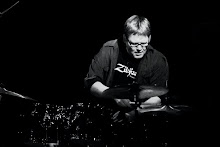Extreme listening is probably a misnomer, but I wanted to talk about focused listening today. Simply put, it can be as basic as listening with no distractions. I like to practice listening (to recordings) at home as intensely as I would on gig, and try to give it the same sense of responsibility. Try to learn everything you can each time through the recording. As an example, I randomly pulled up this recording from my library.
Wow! Fantastic. Louis Hayes is someone I really have slept on, and I'm going to address that! But here are some brief notes I made on one pass through the recording. I can't say I'd never heard it before, but I don't think I'd listened to it in such an active way before. Okay, here goes…
Notes on Phineas Newborn Jr. “Juicy Lucy”
Trio, Pno, bass, drums,
4 bar piano intro
AABA tune,
2 feel on the As in head, 4 to the bar on bridge
higher dynamic on bridge in head
4 feel for solos
Piano solos first
plays 8ves, busy stuff too
four on snare and piano comping in second chorus of piano solo for first 2 As
bass solo 2nd, dynamic in piano and drums significantly lower 2As
“Shout”in B section
Last A back to the head
2 bars tagged 3xs
4 choruses in total
So, not bad. As you can see, the first listens are about a lot of the macro issues of the recording. These include things like form, how many solos, instrumentation, overall dynamics etc. But this is just the beginning. In subsequent listenings you can get to things like dynamic curve and interaction between soloist and drums, and specific drum things you want to lift, is the tune a contrafact of another tune, listening to each player individually all the way through, etc. This is where the real deep learning takes place and of course, can be a great alternative to physical practice as it's easily as, if not more important.
Happy EXTREME listening, but don't be chicken about it! :)




